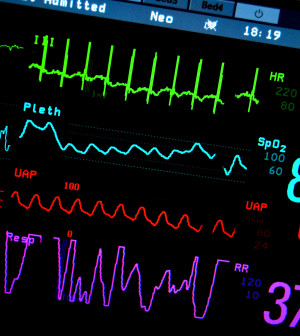- Could Your Grocery Store Meat Be Causing Recurring UTIs?
- Are You Making This Expensive Thermostat Error This Winter?
- Recognizing the Signs of Hypothyroidism
- 10 Strategies to Overcome Insomnia
- Could Artificial Sweeteners Be Aging the Brain Faster?
- Techniques for Soothing Your Nervous System
- Does the Water in Your House Smell Funny? Here’s Why
- Can a Daily Dose of Apple Cider Vinegar Actually Aid Weight Loss?
- 6 Health Beverages That Can Actually Spike Your Blood Sugar
- Treatment Options for Social Anxiety Disorder
Women Twice as Likely to Die From Severe Heart Attack, Study Finds

Women are up to twice as likely as men to die from the most dangerous type of heart attack, a worldwide study finds.
Although death rates have fallen, there are still significant survival differences after what’s called ST-segment elevation myocardial infarction (STEMI), according to the Yale University-led team of investigators.
The study “highlights that there is a gender discrepancy between men and women in mortality outcomes with STEMI,” study first author Hyon Jae Lee said in a Yale news release.
The researchers analyzed data from more than 700,000 STEMI patients in 29 countries and six geographic regions. In all those regions, they found that appropriate treatment was delayed for women and that the in-hospital death rate for women was double that of men. Also, women were 70 percent more likely to die at 30 days, six months and one year after the heart attack.
The findings were presented Monday at an American College of Cardiology meeting in Chicago. Until published in a peer-reviewed medical journal, the findings should be considered preliminary.
“All countries were affected, even here in the United States and Europe, where there are STEMI initiatives that are meant to optimize care for everybody,” Lee said. “That highlights the need to delve into this question and figure out why women have twofold higher mortality rate than men.”
The gender gap is likely due to differences in awareness about STEMI symptoms, access to care and risk factors, the researchers said. For example, women tend to be older when they suffer this type of heart attack and to have a higher number of other health problems, such as diabetes.
From the time of hospital arrival, compared to men, women experienced an average delay of 5.3 minutes before blood flow to the heart was restored, the researchers discovered. This is significant, they said, noting survival hinges on minimizing treatment time.
More information
The U.S. Office on Women’s Health has more about heart attack.
Source: HealthDay
Copyright © 2026 HealthDay. All rights reserved.










